- Home
- Muriel Jensen
Always Florence Page 3
Always Florence Read online
Page 3
“Yes, I do. But we shouldn’t mention it unless she does.”
“She’s kind of skinny,” Sheamus contributed. “But I like her. We should have her over for dinner sometime. When Stella makes that Mexican stuff with the chicken and the corn chips.”
“Mexican chicken casserole.” Nate nodded. “I like that, too. But Bobbie has a lot of work to do. Especially after what happened today.” He let that hang in the air a moment for guilt effect. It was probably bad parenting, but he was just an ignorant bachelor pressed into service.
“She could come on game night,” Dylan suggested. Nate studied the boy, wondering why his nephew suddenly seemed keen on the woman. Could it have been the brownies? “When Hunter comes over to watch our big TV.”
Hunter had lost his own accounting business when his office manager embezzled from him, then disappeared. Hunter had liquidated all his assets to pay creditors and his employees, then moved into the Grand Apartments with a few pieces of furniture he’d saved, and an old television he’d bought at Goodwill. He loved coming over to watch big games and play-offs on Nate’s plasma TV.
“We’ll see how it goes.” Their neighbor had kindly given them brownies, but he couldn’t imagine she’d want any more to do with them.
“I don’t think she has a husband.” That was from Sheamus, who thought Nate needed a wife. Nate had explained over and over that he had more than he could handle with the two of them and the business, but the boys’ mother had been a wonderful, warm, funny woman, and Sheamus was trying hard to put those qualities back into his life. He didn’t realize that not all women were like Sherrie.
“I didn’t see a ring.” That was from Dylan, who enjoyed stirring things up.
“She could have a boyfriend.” Nate paused to sip at his coffee and thought longingly of that gin and tonic. “There’s no way of knowing that.”
“If she isn’t married to him,” Dylan said, “it doesn’t matter. She’s still available.”
“That’s a big word.”
“I’m a smart kid.”
“I don’t know. A smart kid would stop annoying me by trying to get me married off.”
Dylan met his eyes in the mirror, smiled grudgingly and the subject was dropped.
Nate pulled into their driveway, congratulating himself on a day that had turned out better than it had begun. He’d made peace with their neighbor, found the right costume for Sheamus and had a conversation with the boys that hadn’t ended in tears or with Dylan stomping away.
And they had brownies. All in all, a successful afternoon.
* * *
BOBBIE DUNKED AN English Breakfast tea bag into the hot water in her favorite pink mug and picked up her ringing phone. The caller ID read Molloy, D. J. She prepared herself to lie through her teeth.
“Hi, Dad!” she said cheerfully, carrying her tea to the kitchen table and sitting down. Monet leaped onto the table and rubbed against her face. He smelled of fabric softener. He’d been sleeping on top of the dryer again. She pulled him onto her lap. “How are you doing? How’s the arthritis?”
“Under control.” His voice was deep and gentle. It had soothed many a patient in his long career as a general practitioner. He was retired now, and Bobbie’s health had become his focus. “I’m taking my glucosamine chondroitin and getting my exercise. How are you? Still thinking the move to Astoria was a good idea?”
When she’d left Los Angeles to come here, she’d had a hard time convincing him she’d be fine on her own. He’d watched over her treatment, moved in with her to manage her recovery, and hovered over her with suggestions about diet and exercise until she knew she had to get away. Not just for herself, but for the single women in Whittier, California, who were interested in him but had taken a backseat to his daughter’s illness and recovery. Bobbie wanted him to reconnect with his own life so that she could go to Florence with a clear conscience.
The commission from Sandy Evans’s office had come at the perfect moment. Bobbie could have completed it in Whittier, but the lease was up on her apartment and she didn’t want to sign another one, or move in with her father. When she’d explained her predicament to Sandy, her friend had offered her the monthly rental of this tiny two-bedroom in Astoria that she’d inherited from her aunt. The selling point had been the two-car garage that Bobbie used as a studio for messy papermaking.
“I love it here,” she said. That was true. The hilly old neighborhoods with their turn-of-the-twentieth-century homes were wonderful for walking, collecting leaves and flower petals, and enjoying beautiful vistas. Even in tightly built areas there was the occasional empty lot where she could see the broad Columbia River and the Washington hills on the other side. “I walk all the time and the air smells of wood smoke and pine.”
“Mmm. That sounds heavenly.”
Encouraged by his approval, she went on, stroking the cat as she talked. “Sometimes, on the river walk, which is this wonderful paved strip that runs a couple of miles right along the water, you get a whiff of fish and diesel because of the fishing boats, but I’ve come to love that, too. It’s a very lively, working waterfront.”
“Are you getting acquainted with anyone? You’re not just spending all your time working in your studio and walking alone, are you?”
“I am meeting people,” she fibbed. “Of course, I have to spend a lot of time on the commission, but Sandy has introduced me to her friends.” Bobbie hesitated a moment. That was a big lie. Sandy was a single mother with two little girls and a full-time job. She was always working for one worthy project or another, and barely had time to go to the bathroom, much less party with friends. But Bobbie’s father must have lost the lie-detector skills he’d had when she was in high school, so she forged on. “And just today, I met my neighbors. Well, I’ve seen them come and go, but there hasn’t really been time to talk until this morning, when Nate and the boys came over.”
“And his wife?”
“Nate’s a single dad. Well, an uncle, actually, and I’m not sure what happened, but his two nephews live with him.”
“Really.”
She heard it in her dad’s voice. Speculation on the possibilities.
“I’m not getting married, Dad,” she stated quickly, firmly. “I explained it all to you. A couple of times, as I recall. I’m going to Florence in January.”
“Did I say anything?” He sounded innocent and a little injured.
“You didn’t have to. I can read it in your voice.”
“Hmm. New skills acquired through chemotherapy, no doubt. Because in the past, you’ve always heard my voice, but I’ve never noticed that you listened to it.”
“Ha, ha. Very cute. I’ll be thirty in February. It’s time I did what I was born to do.”
“We’re born to love and be loved,” he said gently.
She agreed. “We are, but I love Michelangelo, Tintoretto, Monet, Renoir, Giacometti.... And when I see their work, it’s as though they love me back.”
She heard her dad draw a breath, and knew he wanted to take issue with that, but he changed the subject instead.
“I’m coming to see you,” he announced abruptly.
Oh, God, no. It had been hard enough to pull away from him once—for him and for her. It would be awful to have to do it again.
“I thought you were going to come and visit when I get to Florence.” Her voice sounded high and a little strained. At least that way she’d have made it to Italy.
“Well, I want to visit you there, too. But I thought we should spend Thanksgiving together. I know it’d be too hard for you to come here, so I’ll come up there. I got a new van, did I tell you that? Actually, it’s new to me but a couple of years old. I can throw all my stuff in the back, a sleeping bag, and be gone at a moment’s notice.”
“No, you didn’t tell me. And...wow.” Her attempt
at excitement fell a little short.
“You don’t mind, do you?”
“Of course not.” She answered quickly, decisively. She couldn’t hurt his feelings. The cat looked up at her, as though sensing her ambivalence. “It’ll be fun. When will you be here?”
“How about the Monday or Tuesday before Thanksgiving?”
“Perfect.” She just had to make sure her commission was completed so she could show him around. She could do this.
“Great.” She could hear the smile in his voice and was glad she’d made him happy. Then he added with a sudden burst of speed, “I’ll stay through Christmas, then we can say goodbye.”
She closed her eyes and pressed her lips together to prevent anything he wouldn’t want to hear from coming out. Through Christmas? He’d done that deliberately. He’d been a very astute father and he’d always read her like a book. He knew she wanted to be on her own to prepare herself for Florence. Leaving family and friends behind was difficult, but she was desperate to do this, so she’d started with the move to Astoria. And now he was doing his best to foil her plans.
He didn’t want her to go. He’d been clear about that more than once. He considered her still too delicate to be on her own in a foreign country with what some considered less sophisticated medical options. Or—she had to face this—he was afraid she’d die there and he’d never see her again.
But she felt sure she had time. She didn’t have forever, but she wanted to spend all the time she did have stretching the artist in her to the furthest reaches of her talent. And she couldn’t do that with her father’s arms around her. Or a husband’s.
She ramped up the cheer in her voice. “That’ll be fun, Dad. I’ll love showing you around. This is the most beautiful place, everywhere you look.”
He expelled a breath. Relief, she guessed. “Good. Good, Bobbie. I’ll see you in about a month.”
“Okay, Dad.”
“Okay. I love you, baby.”
“Love you, too, Dad. See you soon.”
“Bye.”
She turned off the phone and growled and stamped her foot. Monet jumped down and meowed in protest. Bobbie stroked him with the sole of her shoe. She wanted to cry, but she didn’t let herself do that anymore. It was a waste of energy and she had too much to do.
She could do this. She could walk into her father’s embrace one more time and be able to let him go at the end of it. She just hoped he could do the same.
She sipped at her tea and carried the cup to the second bedroom, where she had a drafting table and her paints and inks. She put her cup safely out of the way and leaned over the piece she was working on. A quote from Oliver Wendell Holmes about dying with one’s music unsung was partially complete. It was going well. She wouldn’t say that aloud, of course, because it had a way of jinxing a project, but she could admit to being happy with her progress.
She had just pulled her stool into position when there was a rhythmic knock on the front door. Sandy. “Come in!” Bobbie shouted.
Tall and red-haired and just a little plump, Sandy Evans breezed into the room in jeans and a short, pumpkin-colored jacket. Her two little girls, Adalyn—Addie—and Zoey, were with her. Three and four respectively, they were fair-haired like the father, who’d walked away after Addie was born, claiming to be overwhelmed.
Sandy didn’t know what the word meant. She worked full-time as an office manager, was completely devoted to her daughters and still found time for community involvement. She made Bobbie feel like a slug.
She dropped a white paper bag on Bobbie’s table, then came around to look over her shoulder at the artwork. She was distracted for an instant when Zoey reached out to touch a jar of paintbrushes. “Hands in your pockets, girls,” she said. “No touching. This is all important stuff to Aunt Bobbie, and we don’t want to break anything.”
Leaning over Bobbie’s shoulder, she breathed an “Oh!” of approval. “That’s going to be gorgeous!” She pointed a pumpkin-painted fingernail at a pale blue flower petal in the paper. “What is that?”
“I dried hydrangea, and took one of the petals.” She indicated another spot. “That’s a hawthorn leaf. And that longer yellow petal is from a forsythia I saved from the spring.”
Sandy gave her shoulders a squeeze. “You are so clever. And that’s what I came to talk to you about.”
Bobbie opened the white bag. Sandy had brought a berry scone from the Astoria Coffee House downtown, one of Bobbie’s favorite indulgences.
She looked up at her friend suspiciously. “Thank you, but what do you want from me that requires a bribe?” The girls came closer at the possibility of treats. “Can I give them a bite?”
“Just a little one.”
Bobbie broke off two chunks and offered them to the girls, who accepted greedily. Then she tore one off for herself.
“Astor School needs someone to help with a couple of art classes for the lower grades. The budget for that kind of thing is gone this year. Would you do it?” Sandy waited expectantly.
“How do you know they need someone? Your kids aren’t even in school yet.”
“My boss is on the school board, and our office is donating supplies if we can find a teacher.”
“But I’m here only until January.”
“Holidays are when the kids get restless, and art gives them something fun to focus on. What do you think?”
“Sure. I guess.” She wanted to help, but wasn’t certain she was qualified. “I don’t know a lot about teaching children. I suppose I can find projects on the internet.”
Sandy opened the big tote she carried as a purse. A sock monkey wearing a tutu and ballet shoes tumbled out as she withdrew a large paperback. She held it up. The title was Holiday Art Projects for Elementary Grades. She handed it to Bobbie, while Zoey rushed to rescue her ballerina monkey.
“Thank you.” Bobbie flipped through the book. The projects were simple and she’d seen them before, but that was probably good for children. Maybe she could handle this.
“So, you’ll do it?”
“What’s the schedule?”
“Once a week, Friday mornings, ten to eleven-thirty—until the kids get out for Christmas break.”
“I’m still working on the pieces for your office, remember.”
A wave of Sandy’s hand dismissed that as a problem. “I know you to be brilliant. You’ll get it all done. And what’s an hour and a half a week?”
Bobbie hadn’t intended to get this involved in her temporary residence, but she remembered how exciting her art periods had been in grade school. She liked the thought of providing that sense of fun and discovery to kids. And her father would love knowing she was spending time away from her studio.
“Okay, I’ll do it. Should I call the teacher?”
“I put her name, number and email on the bookmark.” Sandy indicated where it protruded from the book. “She’ll be thrilled. Great! Okay, girls.” Bobbie’s friend shepherded her daughters toward the door. “Can we come by and trick-or-treat?”
She got up to walk them out. “I’d be disappointed if you didn’t. In fact, I made you something to put on your front porch.”
The three followed her into the kitchen, where she retrieved a medium-size pumpkin sporting a cat face. She’d cut off the top and cleaned out the seeds, then carved part of the eyes and nose. With a special tool, she’d removed only the orange skin and thinned out the pumpkin flesh in a few places, defining the cat’s features so that a candle would shine through. The cat had a whimsical expression, wide eyes, whiskers, and a tongue protruding from his scalloped mouth. She’d placed a flameless candle inside and turned it on to demonstrate.
The girls giggled and squealed. Bobbie felt as fulfilled as if she’d sold a 24” x 36” oil on canvas.
She pointed to two smaller pumpkins she
’d made with less interesting faces, but that she’d drilled to hold a wire loop. She held one up in each hand. “Or do you like these better? You can hang them in the tree in the front yard.”
The girls both voted on the cat pumpkin.
“Okay. I’ll carry it out to the car for you.”
Sandy strapped the girls into their car seats, but there was great protest when she tried to put the pumpkin in the trunk.
“If I set it on the seat between you,” Sandy explained, “it might fall over when we go down the hill.”
Logic didn’t sway them. Bobbie ran into the open garage, found a box the right size and placed the pumpkin in it, then set the box between the girls. Each rested a hand on the pumpkin, delighted.
“There!” Bobbie exclaimed, hugging Sandy. “Peace reestablished.”
“You’re really very good at this, Bobbie. You sure you want to devote your life to art rather than children?”
There was no question. “I’m sure. Now, get out of here so I can get back to work.”
“Incidentally...” Sandy opened the driver’s door, then stopped. “What do you hear from Laura?”
Laura Kirby had been having chemotherapy at the same time that Bobbie had her first infusion. Sandy managed time away from work and her mother was able to babysit so that she could provide moral support. Bobbie and Laura had become fast friends, bonding over their mutual need to accomplish pressing goals. Laura’s was to have a baby—something she and her husband, a law student, had put off until his graduation. Fortunately for Laura, she’d been given none of the drugs that played havoc with a woman’s fertility.
Laura and Bobbie had lunch occasionally, and since Bobbie had moved to Astoria, kept in touch through email. Sandy had seen Laura just that one time, but had liked her and was happy that she and Bobbie had forged such a strong friendship.
“Is she pregnant yet?”
“Latest report, not yet,” Bobbie replied. “But they’re having fun trying.”
“Great! Next time you email, tell her I said hi.”

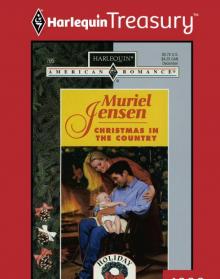 Christmas In The Country
Christmas In The Country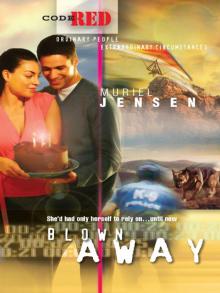 Blown Away
Blown Away In My Dreams
In My Dreams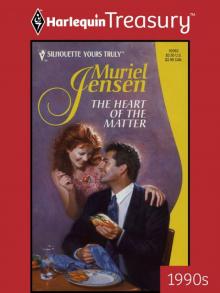 The Heart of the Matter
The Heart of the Matter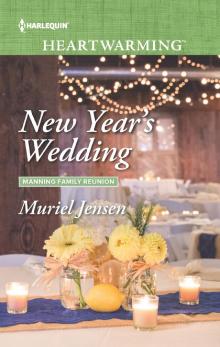 New Year's Wedding
New Year's Wedding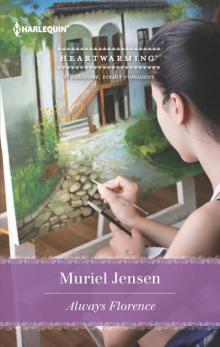 Always Florence
Always Florence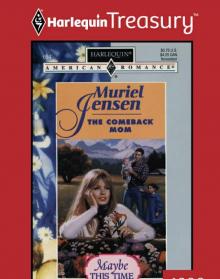 The Comeback Mom
The Comeback Mom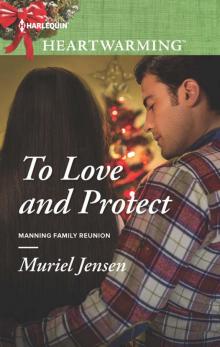 To Love and Protect
To Love and Protect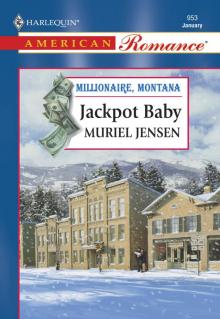 Jackpot Baby
Jackpot Baby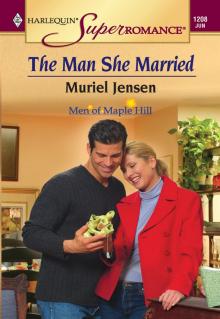 The Man She Married
The Man She Married Love Me Forever
Love Me Forever